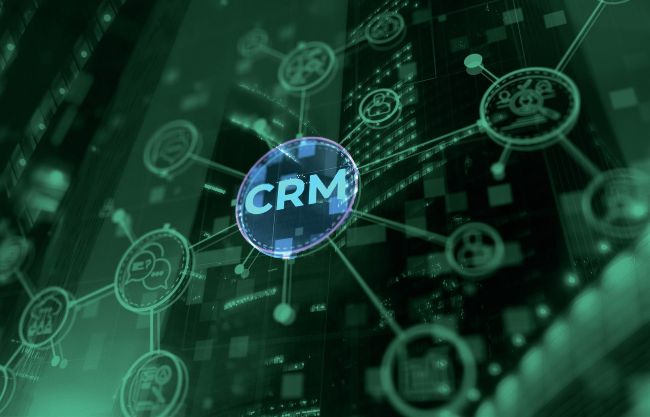WHAT IS A CRM, AND DO YOU REALLY NEED ONE? (Spoiler: yes, you probably do)
If your gun shop or shooting ground has ever lost track of a customer, missed a follow-up or forgotten a key booking, a CRM system could be the simplest way to raise your game. Philip Montague explains what a CRM really is, how it works and why even small businesses in the trade can benefit.

IMAGE: SHUTTERSTOCK - DADBUSINESS
CRM stands for Customer Relationship Management. It sounds like jargon, and it’s used like jargon in most industries. But at its simplest, a CRM is just a tool that helps you remember who your customers are, what they wanted, and when to talk to them.
Let’s break it down, no fluff.
WHAT IS A CRM?
A CRM is a place to store customer information, but more importantly, it’s a tool to help you use that information to grow your business.
It usually includes:
• Names, phone numbers, and email addresses
• Notes about what customers have bought or asked for
• Booking history (like lessons or services)
• Follow-up reminders
• Automated messages (e.g. “your shotgun is due a service”)
Think of it like a smart, searchable diary that doesn’t forget, doesn’t get lost, and works whether you’re in the shop, out on the ground, or at home with a brew.
Now you could use the notes sections in a tool like GunTrader to keep this information, but that doesn’t give you all the other benefits of a CRM, or allow you to be proactive.
5 PRACTICAL WAYS A CRM HELPS GUN SHOPS AND SHOOTING GROUNDS
Here’s what this looks like in real life:
1. Never forget
If someone stores a shotgun with you, or you recommend a service every 12 months, your CRM can remind you, and them, automatically. A simple email: “Just a reminder, your Blaser F16 has been in storage 11 months. We’re open this Saturday if you’d like to collect or service it.” You’d also benefit from using the same function for membership renewals if you’re a shooting ground.
2. Follow up with first-time customers
Someone comes in, tries a gun, but doesn’t buy. Or they call about information on something you don’t stock. That’s an opportunity to offer a call back or follow up contact and to collect their email address. Your CRM can create a follow-up task in seven days. “Hi Ben, just checking in, were you still considering that 525? We’ve had a couple more come in since.”
It’s these small nudges that make sales through excellent service.
3. Segment your customers
Not everyone on your list wants the same thing. Someone who books driven game lessons doesn’t want updates about kids’ taster sessions. A CRM lets you group people and send the right message to the right audience, automatically. Shooting grounds are often guilty of this. I get email invitations to everything, not just the things that are most relevant to me.
4. Build a profile over time
If you know someone shoots 28 gauge and likes Beretta, that’s useful. If they only shoot Wednesdays and bring a group of four, that’s gold dust. Over time, your CRM builds these insights for you. Use that insight, especially when it’s common to more than one person (and you have a new segment) to tailor what you buying in and what experiences you’re offering.
5. Turn service into reputation
When you remember names, preferences, and past visits, you feel like the kind of business that people want to recommend. And in this trade, recommendation is everything. People that have excellent experiences will also return and spend more.
A QUIET BONUS: SECURITY
There’s another benefit most people don’t think about, and that’s security.
When you keep handwritten notes, spreadsheets, or even bits of customer data on random devices via WhatsApp, you’re at serious risk if anything gets lost, stolen, or compromised. I’ve seen more than one business scramble after a lost phone or laptop.
And the best part? Most platforms require two-factor authentication, which adds a layer of security you should be using anyway (see February’s column if you missed it).
In a world where data privacy is serious business, this isn’t just a nice-tohave, it’s part of staying compliant and building trust.
GETTING STARTED
Getting started is easier than you think. Tools like Zoho and HubSpot offer free plans that are perfect for shooting businesses. Add your top customers, note what they’ve bought or booked, and set a few reminders. It’s a simple way to stay organised and grow loyalty over time.
The cost of CRM tools is designed to go up only as your business is realising the value so it shouldn’t be a tough choice.
FINAL THOUGHT
We’re in the relationship business. The better you remember and serve people, the more they’ll come back, and tell their friends about your services.
A CRM isn’t just for tech companies or big corporates. It’s for any shooting business that wants to be more professional, more reliable, and more profitable. And now more secure, too.
If you’d like help choosing or setting up a CRM for your business, I’m always happy to chat.
GET IN TOUCH
E: monty@mk38.co.uk
Instagram @MontyShoots